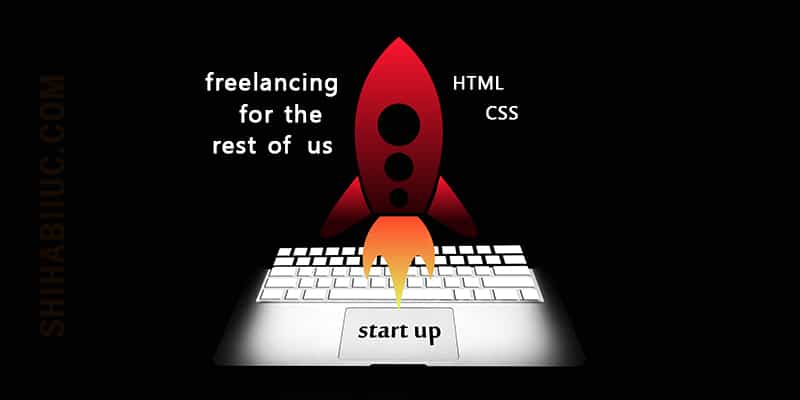Freelancing means working independently. And the person who does freelancing is generally known as a freelancer, independent contractor, seller, etc. And a freelancer is not employed by any organization or employer. Instead, freelancers work for various clients on a contract basis. Freelancing is different than outsourcing.
A freelancer can take many jobs and work on them within a stipulated time. Likewise, the freelancers are self-employed. And different companies & other people can hire them on contract basis. As a result, a freelancer can work for multiple companies & people at the same time.
However, many people think that they need to work on freelance marketplaces in order to be a freelancer. But this is not the case. A freelancer may also get jobs from his/her own website, social media, personal communication, reference, etc.
Is freelancing hard?
It’s very easy to start but it’s not so easy to continue. Because the freelance marketplaces are saturated.
I gathered data for the top seven freelancing countries (2020). It contains three types of data: the number of total freelancers, active freelancers, and those who quit freelancing.
The data shows that more than 83% of freelancers quit freelancing in the first year (based on the average of the 7 countries).
But don’t lose hope yet. The platform needs more freelancers who are experts.
Above all, freelancing is hard for newbies and easy for experts who know their staff very well.
Required environments for freelancing
For a freelancer, it’s not mandatory to work from home or work alone. A freelancer may or may not have an office. Also, a freelancer may work within a team. And a team may involve freelancers from different countries.
So freelancing means those persons who
- do not have an exact office hour.
- is not employed by an organization.
- work independently.
- only get hired for their proper skill set.
- do not have an appointment letter.
- generally, work for clients for a short period of time.
Freelancing benefits
As a freelancer, you can enjoy benefits like working from anywhere and becoming your own boss.
Freelancers can earn more money if they spend more time on their work. They can raise their rates if they gather more skills or increase their level of expertise.
Freelancing disadvantages
Freelancing has some disadvantages too. It is difficult to maintain a work-life balance. Freelancers don’t get any benefits of insurance, yearly bonus, or guarantee of their job till retirement.
Also, there is no certainty whether you will get the job for a year or not. The freelancing marketplaces will deduct 20% as their commission from your earnings. (if you work via the freelancing marketplace).
Learn more about the pros and cons of freelancing.
Freelancing websites

There are lots of freelancing websites out there. A few of them are limited to a specific niche.
For example- freelance websites are only for designers, writers, etc. And the rest of the freelancing websites have been designed for various types of works, from graphic designing to programming and almost for everything.
Learn about top freelance websites.
How much you can earn from freelancing?

Freelancers’ earnings depend on two main factors: expertise & field of work.
An expert freelancer’s rate is higher than a mid-level or beginner’s. So the qualification does matter for the earnings.
On the other hand, the field or type of work is also a big factor. Payment for a complex project is higher than a simple or general type of work. For example- a programmer’s rate is higher than a data entry operator’s.
A beginner virtual assistant generally charges $5 per hour. And a beginner graphic designer is generally paid $10 per hour, and a web developer’s (beginner) rate is $15/20 per hour. Based on this example- a beginner-level freelancer can earn $10 per hour (average). So if he/she works 8 hours daily, the amount is $80 per day and $2400 each month.
If the freelancer gets jobs via a marketplace, they will deduct 20% from the earnings. That means the monthly earnings will be (2400-480) = $1920.
The money-making pictures you see on the internet, all are fake. It takes hard work, patience & consistency in order to succeed. And even you may end up with no earnings at the very beginning of your freelance career. But if you gain skills consistently and stick with your path, a good time will come for you.
Conclusion
Freelancing is the absolute replacement for the 9-5 regular jobs. Moreover, it gives you the freedom to work from anywhere and without the binding of office hours. You can earn according to your quality, skills, effort & time which is not possible on regular jobs. Finally, freelancing makes you the boss of yourself (just like I became my own boss after leaving 8 years of regular jobs).
It takes time to get the expected output from freelancing. The time could be 6 months to a few years. It not only requires hard work but also consistency & patience in order to succeed.


